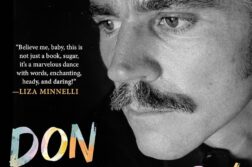 FILM DIRECTOR Gregg Araki was born in Los Angeles on Dec. 17, 1959. The only child of Japanese parents, he grew up in Santa Barbara, eventually earning a masters degree in film production from the USC School of Cinema/TV. He currently lives in Los Angeles.
FILM DIRECTOR Gregg Araki was born in Los Angeles on Dec. 17, 1959. The only child of Japanese parents, he grew up in Santa Barbara, eventually earning a masters degree in film production from the USC School of Cinema/TV. He currently lives in Los Angeles.
Araki actually started his film career as a music critic for the LA Weekly, and the influence of music in his films is unmistakable. After making two small movies in the late 80’s, in 1992 he released his third film, The Living End, to critical acclaim and a major Sundance nomination. A love story involving two HIV-positive men, The Living End was dedicated to “the hundreds of thousands who’ve died and the hundreds of thousands more who will die because of a big, white house full of Republican fuckheads.”
Since then Araki wrote and directed Totally F***ed Up, The Doom Generation, Nowhere, Splendor, and This is How the World Ends. A contemporary of other gay filmmakers such as Todd Haynes (Poison and Far From Heaven) and Gus Van Sant (My Own Private Idaho and Last Days), Araki’s work is distinguished by his brash camera style and by the outspokenness of his characters.
Araki’s latest movie, Mysterious Skin, represents another ratcheting up of his boldness as a story teller and craftsmanship as a director. Based on the Scott Heim’s 1995 novel of the same name, Mysterious Skin is a surprisingly gritty film that follows the lives of two boys who fall victim to a pedophile and respond to the incident in starkly different yet interconnected ways. Running through what Araki called the “angry years” of the Reagan and Bush I administrations from 1981 to 1991, most of the film transpires in Hutchinson, Kansas. There, eight-year-old Neil and Brian play Little League baseball. Both come from working-class families with loving mothers and absent or irrelevant fathers. Despite their similar backgrounds, the two boys could not be much more different. Brian’s lack of skill at baseball is matched by his overall dorky personality, while the outgoing, adorable Neil is the star player and the coach’s favorite. At around the time that Neil and Coach are getting more than a little chummy, Brian has a traumatic experience that causes him to lose track of five hours of his life. Suspecting an alien abduction, Brian is determined to solve the mystery, which leads him back to Neil, now eighteen and working as a hustler in New York City.
This interview was conducted in person in early July.
Gay & Lesbian Review: Why did you choose Scott Heim’s book to be your first adaptation for film? G&LR: What was the greatest obstacle in adapting the book to the screen? G&LR: What about your own childhood did you put into the roles? G&LR: What kind of childhood did you have? G&LR: The film undermines notions about America’s Heartland. If kids from loving suburban homes, playing little league, are not safe, then— G&LR: Yes, but in terms of geo-sexual politics, the more urban the area in your film, the more safe it is about sex. The abuse occurs in Kansas and in a New York suburb. The men in the city are safe and caring. G&LR: What would you say if someone said the reason why this happened to these kids is because of the breakup of the family? The fathers were not around and the mothers were out working. G&LR: The film seems to suggest that whether it is rape or consent, sex is still the greatest power struggle in relationships. G&LR: What do you think society should do with molesters? G&LR: This is not your only film in which aliens play a role. Is there a theme here? G&LR: In what ways have attitudes toward gays changed since you started making films?
Gregg Araki: I read the book back in 1995 and it really had a huge impact on me. It was a very beautifully written story, very dark and disturbing. It had a devastating impact on me. I never really encountered a story like it before. I knew that if I was going to adapt a book one day, it would be Mysterious Skin.
GA: The parts with the small children. I had never worked with kids this young before. I didn’t want to dilute what was so unbelievably powerful about the book and what was so truthful about it. I wanted to shoot the film so the eight-year-old boys could be protected from what the movie was about. I had been experimenting with subjective camera and point of view. I storyboard and edit my own movies. I figured out a way I could get the boys to do exactly what I needed the boys to do in a way they could be kept in the dark about what the actual subject was about. I didn’t want to make a movie about childhood trauma and traumatize two children in the process of making it. It wasn’t until I figured that out that I figured out a way to adapt the book.
GA: I think that was the power of Scott Heim’s book; it was all there. Fortunately, I had never been abused. I never experienced anything like the boys in the movie. Scott was so skillful at weaving all these details about suburban childhood: the little cereal boxes, little league and not fitting in on the team, Halloween, and the scene when the kid is in the car and it’s raining. There are so many sense memories from my own childhood in the story. What was so devastating for me is that you have experienced everything that these kids go through. You feel like you’ve experienced their abuse from the inside out as opposed to the outside in. That is the key for me. Child abuse has become so prevalent and it’s become such a cliché in our society, like the Michael Jackson thing and the Catholic priests, Law & Order. You don’t actually absorb what those kids have been through. That was what was so powerful with Mysterious Skin. I thought, “This is what it must feel like.”
GA: Anybody who meets me is incredibly startled by how ordinary I am. I had the most happy, normal childhood. I just continue to have a normal, happy life. I just work out all this dark stuff in my movies.
GA: Right, that’s the beauty of the book. It’s set in Middle America: apple pie and little league. It’s not set in Greenwich Village. It’s not somewhere “weird” like San Francisco. There are statistics that one in four kids is abused, not just in America but around the world. It’s so prevalent and such a taboo to deal with, unless in the most sensationalistic ways. The actual thought and discussion about it is so forbidden. I hope my film gets people to think about what it is and what it means. There’s no easy solution to the problem but at least it should be acknowledged.
GA: That’s why we kept the story in 1991. It was important for Neil to go to New York, which was a darker time. It was a much more dangerous time. There was the AIDS epidemic and Queer Nation. All that stuff was happening because there was a huge amount of anger, despair and high emotion. Neil is on this self-destructive path. He goes to New York and it puts him in much greater jeopardy. He’s sort of out of his element.
GA: I don’t really think of them as bad mothers. I think of the Elisabeth Shue character [Neil’s mother] as a young mom doing her best and struggling. She has no help, no man. There are so many people in America like that. It is true that this film happens in a place where the fathers are absent or neglectful. The nuclear family in this movie is presented as having somewhat disintegrated.
GA: I think that’s one of the most damaging parts of child abuse in that it is such a violation of trust and abuse of power. Regardless of the situation, an adult and a child are not on an equal playing field. There’s a perversion and abuse of power.
GA: It’s really hard for me to say. My boyfriend is a PhD student in psychology at USC. There really isn’t a cure. There are abuse treatments, but no proven cure that works. Alcoholism and drug abuse are also deeply ingrained but there’s kind of a cure or hope for people. Criminals can be reformed. But I know this problem is deeply rooted in the very makeup of their personality. I can’t say they should all be taken out and shot. But it’s a huge problem. I’m not condoning parents get paranoid and hysterical about it and locking their kids up, but the movie makes parents much more aware and careful about their kids. Yet [the abuse]is so ordinary and prevalent. When we were casting for the film every other person had a story to tell.
GA: Scott came up with the brilliant metaphor of alien abduction and molestation. It has been statistically shown that there is a correlation between these “abductees” and people who have been abused. Scott and I have very similar sensibilities. We’re the same age. We have the same interests in music. We’re gay and part of the young, queer contingent of creative people. We’re also interested in stories about outsiders. This is a huge departure for me in that it’s a serious, character-driven drama, as opposed to my other movies, which are more satirical. I think it’s because I have always been interested in things beyond this reality. I use aliens as metaphorical statements about the world.
G&LR: Would you explain the role of music in Mysterious Skin, which has a score by Robin Guthrie of the Cocteau Twins and ambient legend Harold Budd?
GA: This film was influenced by early 90’s bands like My Bloody Valentine, Ride, and particularly the Cocteau Twins. I listen to music when I write. The score is the soul of the movie. Its rich, ambient kind of music was inspirational for the story. Scott and I listen to music when we write. The score is the essence of the movie.
GA: It’s interesting to me how far we have come in fourteen years. Obviously we have had our share of major setbacks, like the elections. Society has gotten so much more open and tolerant. It’s kind of like night and day. The world has become a much tighter and more open place. Today kids seem shocked when they see [other]parents kick their children out of the home for being gay.




